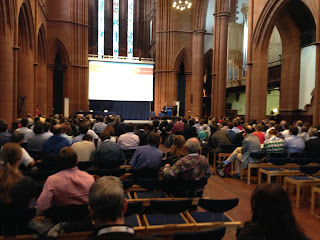I returned last night from Europe where I spent the last 3 weeks at 3 different conferences and transiting between them. During this period I was privy not only to major current events but also history in the making since I was in Greece during the financial crisis (and ultimate bailout) and even in Vienna where US Secretary of State John Kerry helped in the successful Iran nuclear negotiations.
This past week, I had the pleasure of taking part in the EURO 2015 conference in Glasgow, Scotland, which I have blogged about, and, on Tuesday, I was privileged to hear Professor Alan Wilson of the University College London deliver his keynote talk on the Future of Cities in the beautiful Barony Hall, which was packed. He is the Professor of Urban Regional Systems. His extensive, wide-ranging contributions are both in research as well as in administration.
Sir Wilson began his talk by stating that "he secretly thought that he always was an Operations Researcher," and then stated that he is an Operations Researcher.
Coincidentally, I know of his work through Regional Science and both Sir Alan Wilson and I were elected Fellows of the RSAI (Regional Science Association International) in the same year - in 2007!
Sir Wilson's passion is cities, since he is concerned with the biggest of big problems.
I so much enjoyed his plenary talk in which in emphasized nonlinearities, complex systems, and the high level of interdependencies in cities (just think of population and infrastructure, for example). He also emphasized the importance of transportation and networks and how infrastructur ties issues of population with the economics of cities.
He stated that his view as a math modeler is "to explore different futures for cities."
In his plenary, he also mentioned the role of engineers in transportation planning in the US so I have to note again the recent book by Professors David Boyce (who is both an INFORMS Fellow and an RSAI Fellow) and Huw Williams, Forecasting Urban Travel, which I have written about on this blog. You can view Professor Boyce's presentation on 60 years of travel demand forecasting in which he notes the work of Alan Wilson here.
Those of you who were listening closely to Sir Alan Wilson's plenary lecture, may have heard him mention Professor Suzanne Evans. Back in 2003, at a Regional Science conference, Suzanne Evans, joined me, Professor David Boyce, and Hani S. Mahmassani (well-known in transportation science and OR ) on a panel to commemorate the 50th anniversary of the publication of the network classic, Studies in the Economics of Transportation, by Beckmann (who was on my dissertation committee at Brown University), McGuire, and Winsten. You can see photos and presentation if you scroll down on this page.
Sir Wilson, in his ketnte, emphasized 6 challenges of cities in the United Kingdom, and stated that the challenges also apply to other cities and I agree. Specifically, he noted the challenges as being: people (demography), city economcs, the environment and sustainability, urban form (land use and green belts, which I am so passionate about), infrastructure, and governance. He noted that the UK is very centralized and cities are pushing for more decentralization and autonomy.
As a math modeller, Wilson emphasized the high dimensionality of the problems associated with cities and discussed various scenarios for the future of London with powerful graphical displays. One scenario was what would happen if "we killed off the car." Since I have done a lot of work on projected dynamical systems, I enjoyed hearing him speak about Lotka-Volterra dynamics (and relationships even to retail and hospitals), path dependence on initial conditions, forecasting challenges, and the importance of capturing uncertainty in dynamics.
And, since I had been in London, just a few days before travelinng to Edinburgh and then Glasgow, I have to include in this post one of my favorite green spaces in a city - Hyde Park in London.
Many thanks to the organizers of the great EURO conference in Glasgow for bringing to us such outstanding plenary speakers and many other presenters. It was an honor and delight to take part in it!
About Me
- Dr. Anna Nagurney
- Dr. Anna Nagurney is the Eugene M. Isenberg Chair in Integrative Studies at the Isenberg School of Management at the University of Massachusetts Amherst. She was appointed to this chaired professorship on April 14, 2021. Prior to this chaired professorship, since 1998, she was the John F. Smith Memorial Professor of Operations Management. She is the Founding Director of the Virtual Center for Supernetworks, which she established in 2001. Professor Nagurney has held positions at Harvard, MIT, Brown University, Oxford University, the Royal Institute of Technology (KTH), the University of Gothenburg, and the University of Innsbruck. She is the author/co-author of over 235 journal articles and over a dozen books. Nagurney is regularly sought out by major media outlets because of her expertise on supply chains and networks systems plus policies. She has given many keynote and other invited talks internationally.
Subscribe To RENeW


Recent Visitors
Blog Archive
-
▼
2015
(131)
-
▼
July
(10)
- Latest News from the Supernetwork Center @Isenberg...
- Green Spaces in Some Favorite Cities
- Sir Alan Wilson, Regional Science, Operations Rese...
- Operations Researchers Take Over Glasgow, Scotland...
- Optimization Workshop in Majestic Edinburgh, Scotland
- Looking Forward to Being a Visting Fellow at All S...
- An Academic Experiencing History in the Making Whi...
- John Nash's Last Book and the Operations Research ...
- Photos from Our Great Dynamics of Disasters Banque...
- Crisis in Greece but Dynamics of Disasters Confere...
-
▼
July
(10)

























